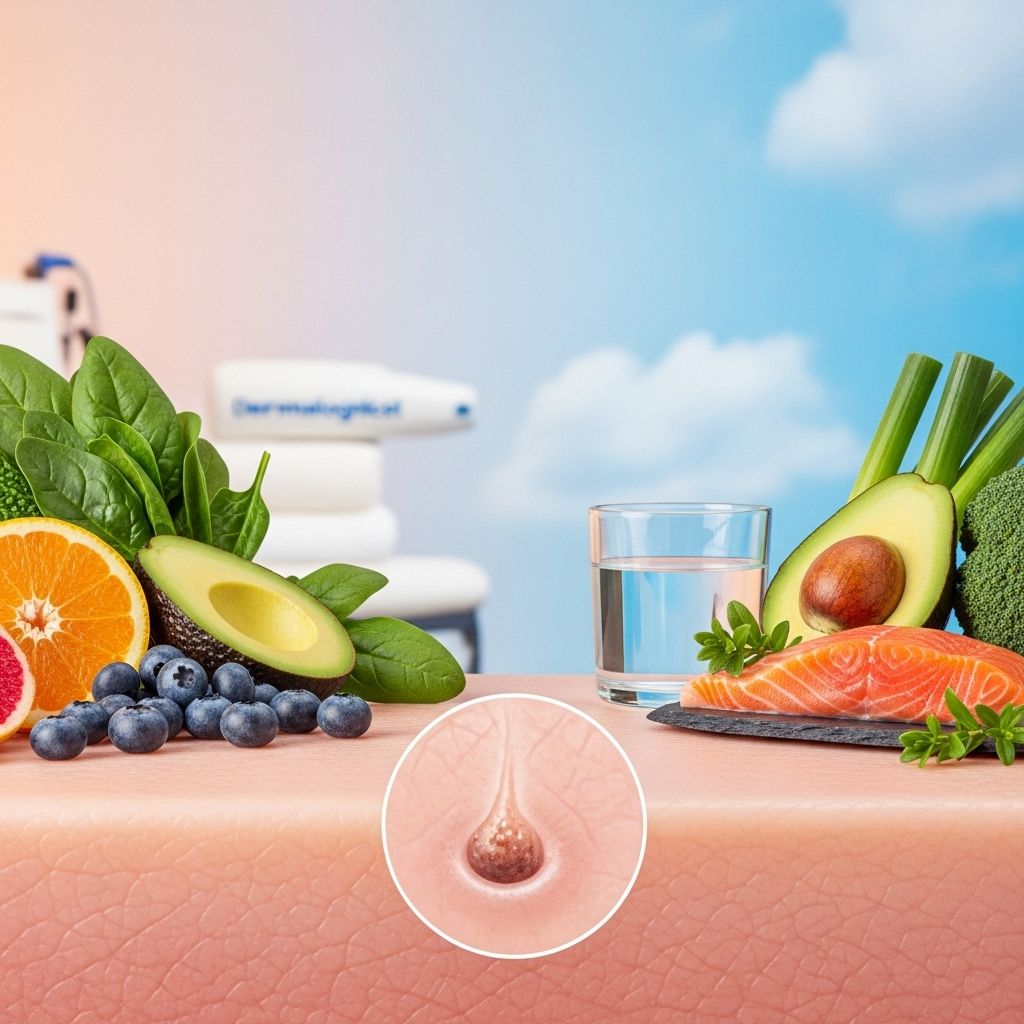Diet for Blackheads & Whiteheads: Avoiding Acne-Inducing Foods
Smart food swaps can curb clogged pores and encourage clearer, healthier skin.

Diet for Blackheads & Whiteheads: Foods to Avoid
Blackheads and whiteheads are common forms of acne that can be influenced by what we eat. While traditional treatments focus on topical creams and oral medications, dietary changes can play a significant role in reducing their occurrence. Understanding which foods exacerbate acne and which ones help alleviate it can be crucial in maintaining clear, healthy skin.
1. High Glycemic Index Foods
High glycemic index (GI) foods increase blood sugar levels and insulin resistance, leading to inflammation and excess oil production in the skin—both of which can worsen acne.
- Examples: White bread, bagels, sugary cereals, candy, chocolate, soda, white rice, potatoes, pastries, donuts, cakes, energy drinks.
- Why they’re harmful: These foods cause rapid spikes in blood sugar, leading to increased insulin release and oil production on the skin.
- Better alternatives: Brown rice, quinoa, oats, sweet potatoes, lentils, vegetables, berries, apples, nuts, and seeds.
2. Dairy Products
Dairy products, particularly those from cows, contain hormones that can stimulate oil production and increase inflammation on the skin.
- Examples: Cow’s milk, ice cream, cheese.
- Why they’re harmful: Hormones like IGF-1 in dairy products can stimulate sebum production, potentially worsening acne.
- Alternatives: Yogurt or kefir might be better tolerated due to their probiotic content.
3. Fast Food
Fast foods are typically high in unhealthy fats and refined carbohydrates, which can exacerbate acne by promoting inflammation.
- Examples: Fried chicken, burgers, fries.
- Why they’re harmful: These foods are rich in unhealthy fats and refined carbs that can inflame acne-prone skin.
- Alternatives: Opt for lean meats and whole foods such as vegetables, fruits, and whole grains.
Foods to Promote Clear Skin
While avoiding certain foods is important, incorporating healthy options can also help manage acne.
1. Low Glycemic Foods
Low GI foods help maintain stable blood sugar levels, reducing inflammation and oil production.
- Examples: Whole grains (quinoa, oats, brown rice), legumes (lentils, chickpeas), vegetables (leafy greens, broccoli, carrots).
- Benefits: These foods regulate insulin levels and promote healthy skin.
2. Anti-Inflammatory Foods
Foods rich in omega-3 fatty acids and antioxidants can calm inflammation and reduce acne.
- Examples: Fatty fish (salmon, sardines), nuts & seeds (walnuts, chia seeds, flaxseeds), berries (blueberries, strawberries, cherries).
- Benefits: Omega-3s and antioxidants help reduce inflammation and support skin health.
3. Drinking Green Tea
Green tea has been shown to reduce systemic inflammation and may help improve skin health.
- Benefits: May balance hormones, reduce inflammation, and support overall skin health.
- Consumption: Aim for 2 to 3 cups per day, preferably decaffeinated.
Essential Vitamins and Nutrients for Acne-Free Skin
Certain vitamins and nutrients play a crucial role in maintaining healthy skin and reducing acne.
1. Vitamin A
Vitamin A promotes cell turnover and prevents clogged pores.
- Best sources: Carrots, sweet potatoes, kale.
- Role: Helps prevent clogged pores by promoting cell turnover.
2. Zinc
Zinc reduces inflammation and regulates oil production, making it beneficial for acne management.
- Best sources: Pumpkin seeds, chickpeas, lentils.
- Role: Inhibits inflammation and supports skin health by regulating oil production.
3. Omega-3 Fatty Acids
Omega-3 fatty acids are essential for reducing inflammation and supporting skin barrier health.
- Best sources: Fatty fish (salmon, sardines, mackerel), flaxseeds, chia seeds, walnuts.
- Role: Combats inflammation and protects the skin’s barrier function.
Other Researched Supplements for Acne
Beyond dietary changes, certain supplements have shown promise in managing acne.
1. Probiotics
Probiotics can improve gut health and reduce systemic inflammation.
- Benefits: May help reduce acne by improving gut health and reducing inflammation.
- Effective strains: Lactobacillus rhamnosus GG and Lactobacillus acidophilus.
2. Vitamin D
Vitamin D deficiency may be linked to acne severity, and supplementation may help reduce acne in deficient individuals.
- Role: May reduce inflammatory lesions in vitamin D deficient individuals.
- Importance: Essential for overall skin and immune health.
Frequently Asked Questions (FAQs)
Q: Are blackheads and whiteheads the same thing?
A: No, blackheads and whiteheads are not the same. Blackheads are open comedones that appear black due to oxidation, while whiteheads are closed comedones that appear white.
Q: How do dietary changes affect acne?
A: Dietary changes can affect acne by reducing inflammation and regulating insulin and hormone levels, which in turn can reduce oil production and inflammation on the skin.
Q: Are there any foods that can help eliminate blackheads and whiteheads?
A: While there is no specific food that can eliminate blackheads and whiteheads, a diet rich in low GI foods, omega-3 fatty acids, and antioxidants can help reduce their occurrence by promoting healthy skin and reducing inflammation.
Q: What role does hydration play in managing acne?
A: Hydration is crucial as it helps flush toxins out of the body and maintain skin health, which can indirectly help manage acne symptoms.
Summary
Diet plays a significant role in managing blackheads and whiteheads. Avoiding high GI foods, dairy products, and fast food while incorporating low GI foods, omega-3 rich foods, and essential vitamins and nutrients can help reduce acne symptoms. Additionally, maintaining good hydration and considering supplements like probiotics and vitamin D may further support skin health.
References
- https://www.dermatologist-nyc.com/blog/diet-and-acne-foods-to-avoid-and-eat-for-clear-skin-47574/
- https://www.healthline.com/health/anti-acne-diet
- https://www.medicalnewstoday.com/articles/322639
- https://www.vinmec.com/eng/blog/10-anti-acne-foods-that-help-build-skins-protective-layer-en
- https://www.webmd.com/skin-problems-and-treatments/acne/ss/slideshow-acne-best-worst-foods
- https://www.divinederm.com/blog/best-worst-foods-for-acne/
- https://www.aad.org/public/diseases/acne-and-rosacea/can-the-right-diet-get-rid-of-acne
- https://www.nuvancehealth.org/health-tips-and-news/acne-breakout-here-are-foods-that-may-be-causing-it
- https://www.midlandskin.co.uk/what-foods-to-eat-if-you-have-acne/
- https://www.dinastrachanmd.com/blog/a/general-dermatology/3-foods-that-cause-acne/
Read full bio of Sneha Tete












